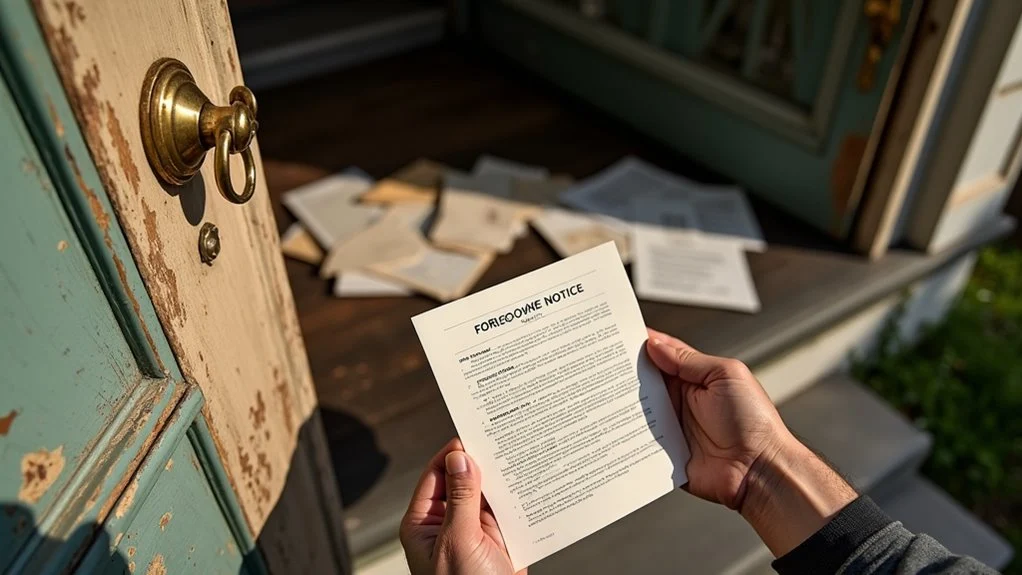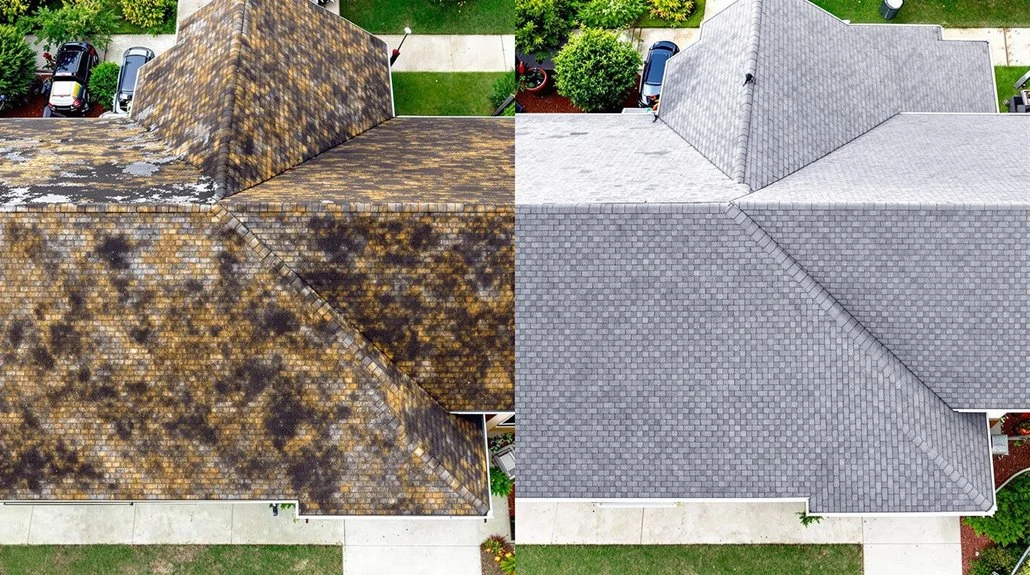When David L. from San Francisco suddenly inherited his aunt’s home in foreclosure, he found himself drowning in paperwork and facing imminent property loss while still processing his grief.
Better House Buyers swooped in after a single phone call, presenting him with a fair cash offer within just 24 hours of his initial contact.
Their team of inheritance specialists guided David through the complicated foreclosure prevention process, handling all the necessary documentation and negotiations with lenders on his behalf.
Within two weeks, David had closed the deal on his timeline, walking away with cash in hand and free from the burden of the inherited mortgage problems that had kept him awake at night.
Key Points
- Heirs are not personally liable for the deceased’s mortgage debt and banks must notify all heirs before foreclosure.
- Immediately verify mortgage details, conduct a title search, contact the lender, and document all communications in writing.
- Challenge improper foreclosure procedures by filing motions if proper notification wasn’t given to all heirs.
- Negotiate with lenders who view inherited properties as risky assets and may offer modifications to avoid foreclosure costs.
- Consider bankruptcy as an option to halt foreclosure proceedings through an automatic stay while exploring long-term solutions.
Understanding Your Rights as an Heir in Foreclosure Situations
Stronger than banks pretend.
Here’s what foreclosure sharks don’t want you knowing about the foreclosure process:
- You’re NOT personally liable for Dad’s mortgage debt
- Banks MUST notify ALL heirs before proceeding
- No notification? File motions immediately
Game changer.
Lenders can’t foreclose against dead people. Sounds ridiculous? It’s law. In Arizona, the foreclosure process typically lasts 90-120 days, and lenders must follow proper legal procedures.
They must change litigation to include you first. Miss this step? Foreclosure gets halted.
Your nuclear option:
Walk away if there’s no equity. Zero personal liability screams freedom.
Got equity instead?
Sell the house. Pay off the mortgage. Keep surplus cash. The foreclosure aims to clear the lien so lenders can sell property free and clear.
Bottom line:
Banks need clear title ownership before stealing your inheritance. Make them prove it.
Types of Inherited Property Foreclosure Scenarios
When inheritance turns nightmare, foreclosure scenarios multiply like sharks smelling blood.
The Death Trap Scenarios:
• Mortgage implications hit hard
Your inherited house comes with monthly payments. Miss them? Foreclosure knocks. Understanding the foreclosure timeline can help you take timely action before it’s too late.
• Multiple heirs equal chaos
Three siblings inherit mom’s house. One wants to sell. Two don’t. Gridlock screams foreclosure.
• Property tax bombs explode
Grandpa’s house needs $8,000 yearly taxes. You can’t pay? Tax lien foreclosure crushes dreams.
• Due-on-sale clauses bite
Bank uncovers ownership transfer. Demands full mortgage balance immediately.
Reality Check:
Joint tenancy? You’re safer.
Sole ownership through probate? You’re screwed.
Tenancy in common with fighting heirs? Disaster waiting.
Bottom Line:
Every scenario sucks differently. Know which trap you’re in before it snaps shut. The estate executor handles the deceased’s mortgage debts while lenders target original borrowers, not you.
Immediate Steps to Take When You Discover Foreclosure Proceedings

Don’t panic.
Don’t hide.
ACT.
Your first 48 hours determine everything. Miss this window? Game over.
Step 1: Mortgage verification****
- Grab every loan document
- Check payment history
- Confirm actual default amounts
Step 2: Lien examination
- Order title search immediately
- Identify all debts against property
- Know what you’re really fighting
Step 3: Call the lender****
Document everything. Record calls if legal in your state.
Step 4: Lawyer up****
Foreclosure attorneys know tricks lenders don’t want you uncovering.
Step 5: Gather estate papers
Probate status affects your rights.
Stop scrolling social media. Stop asking Uncle Bob for advice.
Start fighting back.
Every day you waste costs thousands in equity. State resources like housing finance corporations often provide emergency assistance programs specifically designed for inherited property situations.
Working With Mortgage Lenders and Loan Servicers
Although lenders act like doing business with grieving families is beneath them, you hold more power than they want you believing.
Here’s the truth:
Lenders need you more than you need them.
- Your inherited property = their asset at risk
- Foreclosure costs them $50,000+ average
- Empty houses suck money from their books
Effective lender communication starts with authority.
Don’t grovel. Demand.
Call their bluff when they refuse modifications. Most servicers cave under pressure because foreclosure screams “financial loss.”
Master these negotiation tactics:
- Document everything in writing
- Set firm deadlines for responses
- Threaten alternative solutions immediately
Pro move: Mention selling to investors.
Watch how fast they offer payment plans.
Remember: They’re not doing you favors. You’re solving their foreclosure headache.
Stay aggressive.
Foreclosure Prevention Programs Available to Heirs

Since most heirs panic and assume they’re screwed, they miss the obvious truth.
Foreclosure resources exist specifically for YOU.
Government programs don’t care who’s name was on the original mortgage. What matters? Your heir financial obligations NOW.
FHA Programs
- Loss mitigation for inherited FHA loans
- Zero panic required
VA Benefits
- Veterans get refinancing options
- Even on inherited properties
Homeowner Assistance Fund
- Covers mortgage payments
- Utility bills too
Private Sector Help
- BlueHub SUN refinances inherited homes
- Sells them BACK to you with new terms
Stop being stupid.
Most heirs ignore these programs because they think inheritance = automatic disqualification.
Wrong.
Requirements are simple:
- Stable income
- Late payments (which you probably have)
- Basic documentation
The government actually WANTS to help you avoid foreclosure.
Shocking, right?
Selling the Property to Avoid Foreclosure
When foreclosure breathing down your neck, selling beats losing everything.
Property valuation screams urgency.
Get that appraisal NOW. Market value versus mortgage balance? That’s your lifeline.
Three harsh realities:
- Quick sale = lower proceeds
- Foreclosure = zero proceeds
- Math isn’t hard
You think waiting helps? Wrong. Dead wrong.
Sale negotiation saves your bacon.
Contact the lender immediately. They’d rather get paid than own your mess. Short sale beats foreclosure for everyone involved.
Here’s the kicker:
Inherited property gets stepped-up tax basis. Sell fast? Capital gains disappear like magic.
Ready to move?
Cash buyers close in 7-10 days. No financing drama. No inspection nightmares.
Stop overthinking this. Sell or lose everything to the courthouse steps.
Your choice.
Legal Options and When to Hire an Attorney
Good.
You’re drowning. Legal help? Get it NOW.
When attorneys become your lifeline:
- Foreclosure notices hit your mailbox
- Legal documentation screams gibberish at you
- Estate obligations make zero sense
Stop playing lawyer.
Real attorneys do this stuff:
Challenge bogus foreclosure procedures. File court motions that actually work. Prove your “successor in interest” status so lenders can’t steamroll you.
Here’s the brutal truth:
Miss one deadline? You’re toast. Screw up legal documentation? Property’s gone. Think you can handle estate obligations alone?
Laughable.
Bankruptcy stops everything cold. Automatic stay = foreclosure freeze.
Probate attorneys know local laws. Real estate lawyers crush lender BS.
Cost of attorney: Few thousand dollars.
Cost of losing inherited property: Everything.
Do the math, genius.
Long-Term Strategies for Protecting Inherited Real Estate
Think you’re safe because the foreclosure stopped?
Wrong.
You just bought time. Nothing more.
That inherited property? It’s a ticking bomb without proper estate planning.
Your Real Protection Plan:
- Get a property valuation NOW
- Set up automatic mortgage payments
- Build a 6-month payment emergency fund
- Monitor your credit like a hawk
Here’s the brutal truth:
Most heirs celebrate stopping foreclosure, then get blindsided six months later.
Why?
They never planned beyond the crisis.
Smart move?
Refinance while you can. Lock in better rates. Your deceased relative’s 7% mortgage screams “sucker” when today’s rates hit 6%.
Reality check:
Keep detailed records of every payment, every conversation, every document.
Bottom line:
Stop playing defense. Go offensive with long-term strategy or watch this nightmare repeat itself.
Common Questions
Can Multiple Heirs Be Held Responsible for the Full Mortgage Debt?
Don’t bite off more than you can chew – joint liability considerations show you’re generally not personally liable for the full mortgage debt unless you assume it, though heir responsibilities overview includes maintaining payments if keeping property.
What Happens if the Inherited Property Has Reverse Mortgage Obligations?
You’ll inherit the property with reverse mortgage obligations but aren’t personally liable for debt exceeding home value. Your inherited property rights include reverse mortgage options: pay off the loan, refinance, sell, or surrender the deed to the lender.
Are There Tax Consequences When Stopping Foreclosure on Inherited Property?
You’ll face tax implications when preventing foreclosure on inherited property. Capital gains taxes may apply if you sell, while estate taxes could affect the inheritance. The stepped-up basis rule can reduce your overall tax burden considerably.
How Does Probate Status Affect My Ability to Negotiate With Lenders?
Like a shield in battle, active probate status provides temporary protection from foreclosure actions. You’ll find lenders more willing to discuss negotiation strategies during the probate process since courts can intervene and delay proceedings.
Can I Be Personally Liable for Mortgage Payments Made Before Inheritance?
You’re generally not personally liable for mortgage obligations made before inheritance. Your inheritance rights protect you from personal responsibility until property ownership legally transfers to you through probate or deed transfer completion.
Final Thoughts
Inheriting a property facing foreclosure can quickly turn a family legacy into a financial nightmare without swift action. When mounting debts, complicated paperwork, and aggressive lenders threaten to take your inherited home, time becomes your most precious resource. [Better House Buyers](https://betterhousebuyers.com/) specializes in these urgent situations, providing offers within 24 hours and closing on your timeline—whether that’s days or months. If you’re struggling with an inherited property in foreclosure, don’t let banks dictate your family’s future when a solution is just one call away.
References
- https://ecminchellalaw.com/2025/01/02/understanding-heir-liability-in-property-foreclosures/
- https://denbeauxlaw.com/stop-foreclosure-on-inherited-property/
- https://malawillinois.com/what-happens-if-you-inherit-a-property-in-foreclosure/
- https://www.nclc.org/wp-content/uploads/2023/08/202308_Property-Tax-Foreclosures-on-Heirs-Property.pdf
- https://san-antonio-probate.com/can-a-bank-foreclose-on-an-inherited-property/
- https://www.oflaherty-law.com/learn-about-law/what-should-i-do-if-i-inherit-a-house-in-foreclosure-in-illinois
- https://www.shortelllaw.com/how-to-stop-foreclosure-on-inherited-property-a-guide-for-alaskans
- https://www.trustworthy.com/blog/when-someone-dies/deceased-parents-home-foreclosure
- https://www.klamengroup.com/how-to-stop-foreclosure-and-avoid-bankruptcy-in-missouri
- http://www.hud.gov/helping-americans/avoiding-foreclosure




